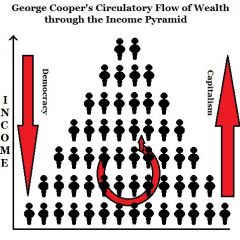America is divided on economics, and specifically on the efficacy of tariffs. Whereas successful businesses love Free Trade, struggling businesses want Tariffs.
East and West coasts vs the Middle
The software companies don’t need tariffs to survive. The US has managed to convince the world that US software giants have a natural right to exists and dominate the whole world. They don’t even need to pay all US taxes, having convinced places like Ireland to be a home for their international sales. This means that the giant companies can “legitimately” pay Irish taxes instead of US taxes.
US banks don’t need tariffs to survive. Yet when they sneeze the whole world catches cold. They are sitting pretty, with the US dollar the international reserve currency. This may change with the advances in BRICS.
US Banks and software companies bring lots of employment and profits to the east coast and the west coast of the US. They are doing well, and want the current situation to continue. The middle of the US is not doing so well, but Donald Trump offers a different way forward, even though there are aspects of Trump’s approach to politics and economics is challenging. Yet there is no indication that the Democrat Presidential candidate has anything to say that will bridge the underlying problem.
Here is what Politico has to say about Kamala Harris’ position on tariffs:
The vice president’s biggest challenge may be defining her policies. And many industrial workers, who will be key to her chances across the Midwest, have already expressed dismay with the economy — even if they’ve been beneficiaries of the Biden-Harris industrial policy push.

History of Tariffs
Tariffs can be considered to have been previously introduced to offset an inherent competitive advantage in the exporting nation. This still continues to be the case. Yet now we realize that tariffs are not a one-way street to success. If they are set too high, this can embed business inefficiency, lead to noncompetitive wage rates, and unnecessarily result in paying higher prices for all goods and services.
Contrary to current economic thinking, tariffs are not a “curse word.” Indeed, the clear rationale for tariffs in the 21st century is to attempt to achieve a rational trade-off between lower prices and “full employment.”
A truly rational trade policy would set a moderate level of tariffs for those sectors of the economy that the government of the nation decides it wants to keep and is in danger of losing. Such a policy would not create a trade war, especially since no nation in the post-Trump world will be able to resist its compelling logic.
Modest Tariffs are needed
Imposing a moderate level of tariffs, even on ALL goods entering a country, should not result in a trade war. Yet even without such a policy we have already got a trade war. Why?
Trump is loved by some farmers. Democrats should be asking why this is the case and offering something similar. Are they? Not as far as I can tell from Australia.
The Democratic leadership just wants to prosecute Donald Trump and cast his supporters as lacking in intelligence. Yet as soon as the software giants and computer hardware suppliers are in economic trouble they want to impose very heavy punitive tariffs on China. Is this rational? It certainly doesn’t help geographically middle America.
In agriculture, it is easy for poverty to overwhelm ordinary producers. A modest tariff will hold back competition, at least sufficiently to allow these producers to survive.
Every country should be reasonably self-sufficient in agriculture, particularly in those countries where agriculture is the main source of employment. If rich countries can allow the farmers in such a countries to thrive, the whole country could be on a path to economic success. Tariffs are the means to achieve this.
A 20% tariff should be available to every industry sector that want this level of protection. The US should encourage every nation to do the same, not try to bully them to remove all tariffs, even ones as low as 20%.
Globalization needs tariffs
Every country needs a diverse economy, including in the Computer-space, to flourish in this very competitive world.
Tariffs can help start-up and establish companies to thrive. If the WTO continues to demonize tariffs and “protectionism” when it will give nations more economic freedom to act, then perhaps the best approach is to demonize the WTO and anyone else who prefers an ideological position to a well argued alternative position.
We will see!
